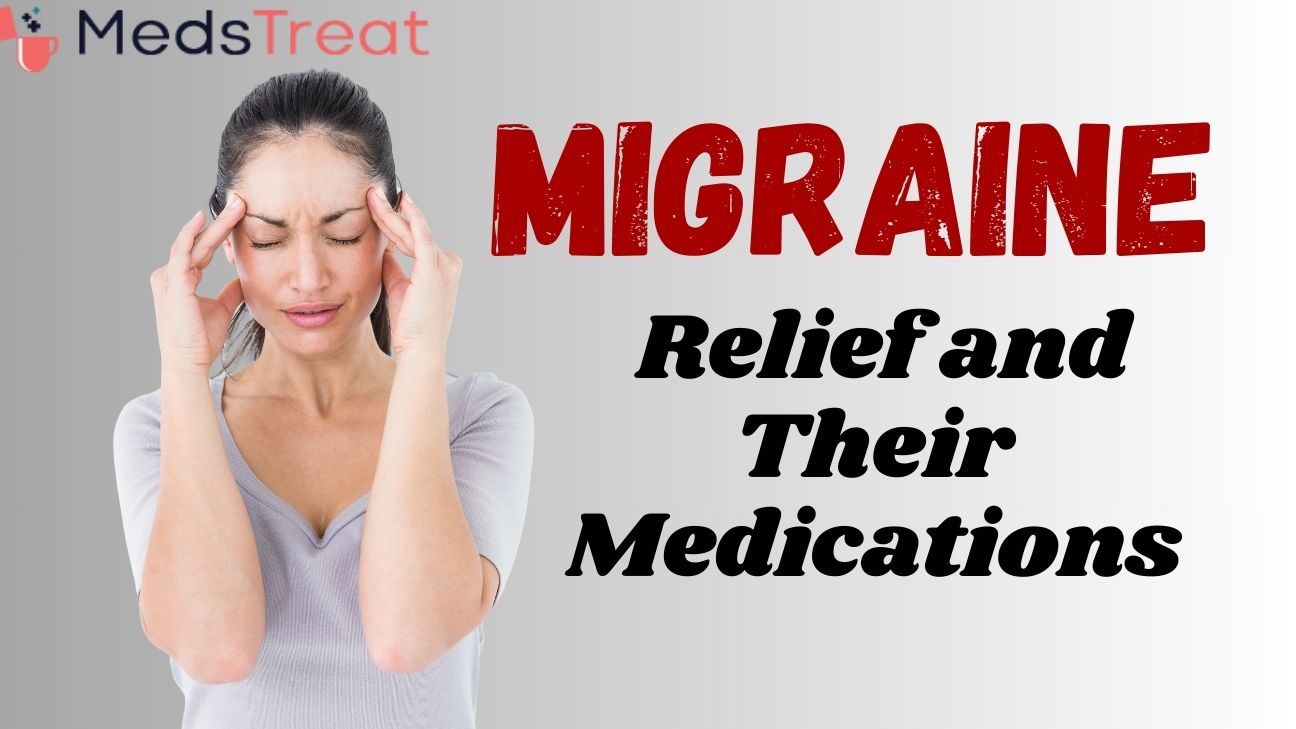Suffering from migraines is the worst kind of headache ever. Migraines are a neurological condition that can generate severe and recurring headaches. Nausea, vomiting, and sensitivity to light and sound are some of the symptoms that accompany these episodes, known as migraine attacks. They can last several hours or even days and significantly disrupt daily life. Although the actual reason is not yet wholly apprehended, migraines are acknowledged to be caused by changes in blood flow and neurotransmitter activity in the brain.
Stress, certain foods, hormonal changes, and environmental factors are some of the triggers that can precipitate attacks. The treatment of migraines focuses on prevention and symptom relief through medications, lifestyle adjustments, and alternative therapies.
Let’s explore how to cure this pain and some of the best medications to get relief.
Lifestyle Modifications:
Identify Triggers: Keep a migraine diary to identify potential triggers such as certain foods, stress, hormonal changes, or sleep patterns.
Dietary Changes: Avoid trigger foods like caffeine, alcohol, aged cheeses, and processed foods.
Regular Sleep: Maintaining a consistent sleep schedule ensures you get 7-9 hours each night.
Stress Management: To reduce stress, practice relaxation techniques such as deep breathing, meditation, or yoga.
Medications: Acute Medications: These are used to relieve migraine symptoms during an attack. Over-the-counter (OTC): Non-prescription pain relievers like ibuprofen, aspirin, or naproxen sodium can help.
Prescription: Triptans, ergots, and anti-nausea medications may be prescribed by a healthcare provider for more severe attacks.
Preventive Medications: These are taken regularly to reduce the frequency and severity of migraines.
Antidepressants: Drugs like amitriptyline or venlafaxine can help prevent migraines.
Antiepileptic Drugs: Medications like topiramate and valproic acid can be effective.
Beta-Blockers: Propranolol and metoprolol are commonly used to prevent migraines.
Calcium Channel Blockers: Verapamil is another option for prevention.
CGRP Inhibitors: Calcitonin gene-related peptide (CGRP) inhibitors are a newer class of medications specifically developed for migraine prevention. They include drugs like erenumab, fremanezumab, and galcanezumab. These medications target CGRP, a neurotransmitter involved in migraine attacks.
Botox Injections: Botulinum toxin type A injections (commonly known as Botox) are approved to prevent chronic migraines (15 or more headache days per month). A healthcare provider injects Botox into specific head and neck muscles every 12 weeks.
Non-Drug Therapies:
Cognitive-Behavioral Therapy (CBT): CBT can help manage migraine triggers and reduce the impact of migraines by changing thought patterns and behaviors.
Biofeedback: This technique teaches you to control physiological functions like muscle tension and heart rate, potentially reducing migraine frequency.
Relaxation Techniques: Deep breathing exercises, progressive muscle relaxation, and mindfulness can help alleviate stress, a common migraine trigger.
Physical Therapy: Targeted exercises and manual techniques from a physical therapist can reduce muscle tension and improve posture, potentially decreasing migraine frequency.
Alternative Therapies: There are alternative treatments such as acupuncture, chiropractic care, and herbal remedies that some people have found to help relieve migraines. However, it is vital to consult a doctor before trying these options to ensure their safety and effectiveness for your specific condition.
Devices: Certain medical devices, like transcranial magnetic stimulation (TMS) or external trigeminal nerve stimulation (SNS), have been approved for migraine prevention and treatment.
Nutritional Supplements: Some individuals find relief with supplements like magnesium, riboflavin (vitamin B2), and coenzyme Q10. However, consult with a healthcare provider before starting any supplement regimen.
Hydration and Diet: Staying well-hydrated and maintaining a balanced diet can help prevent some migraines, particularly those triggered by dehydration or dietary factors.
Ways to cure Migraine pain at home
While there is no absolute cure for migraines, several home treatments and lifestyle changes can aid in alleviating migraine pain and provide relief during an attack. Remember that these methods may not work for everyone, and individual responses can vary.
Here are some ways to manage migraine pain at home:
Rest in a Dark, Quiet Room:
Migraine headaches can be incredibly debilitating, often causing intense pain and discomfort. One of the most common symptoms of a migraine is heightened sensitivity to light and sound. To find relief, it is essential to seek out a dark and quiet environment where you can rest until the pain subsides. This means minimizing exposure to bright lights and loud noises, which can exacerbate symptoms and worsen headaches. By finding a calm and comfortable space to relax in, you may be able to alleviate some of the discomfort associated with a migraine and promote a faster recovery.
Apply Cold Compresses:
If you’re experiencing discomfort or inflammation in your head or neck, you may find relief by placing a cold compress on the affected area. A chilly compress can assist in dampening the pain and lower swelling by constricting the blood vessels. Envelop a few ice cubes in a towel or use a pre-made gel pack and use it to your forehead or neck for 15-20 minutes at a time. Repeat as necessary until you feel more comfortable.
Stay Hydrated:
Migraines are often triggered or worsened by dehydration, which is why it’s essential to stay hydrated. Consuming 8-10 glasses of water daily is suggested for proper hydration. Additionally, it’s best to avoid drinking excessive amounts of caffeine and alcohol as they can further dehydrate the body and trigger migraines. Consuming foods high in water, such as fruits, vegetables, and soups, is also beneficial to help keep the body hydrated and prevent migraines.
Manage Stress:
Stress can trigger migraines, making it vital to take action to lower stress levels. One helpful method is to rehearse relaxation methods such as deep breathing, meditation, or progressive muscle relaxation. In-depth breathing implicates taking slow, profound breaths to relax the mind and body. Meditation involves focusing on the present moment, letting go of distracting thoughts, and reducing stress. Progressive muscle relaxation involves tightening and loosening different muscle clusters, allowing you to release physical tension and promote peace.
Caffeine:
Migraine pain can be debilitating and difficult to manage. One potential option to alleviate this pain is consuming small amounts of caffeine, such as coffee or tea. Caffeine helps to reduce inflammation and constrict blood vessels, relieving the intense pain associated with migraines. However, it is essential to note that excessive caffeine intake can lead to rebound headaches, worsening the situation. Using caffeine sparingly and in moderation is recommended to avoid this potential side effect. Additionally, it is always best to consult a doctor to select the most helpful treatment plan for your requirements.
Ginger:
Ginger has anti-inflammatory effects and may assist in relieving nausea associated with migraines. Try ginger tea or ginger supplements as directed.
Peppermint Oil:
Peppermint oil applied topically or inhaled through steam may relieve migraine symptoms. Cut a few drops of peppermint oil in a carrier oil and gently massage your temples. Acupressure: For migraine relief, apply gentle pressure to specific acupressure points, such as the space between your thumb and index finger (LI-4).
Aromatherapy:
Some people find relief from migraines with essential oils like lavender, eucalyptus, or chamomile. Use a diffuser or inhale the scent directly.
Dietary Considerations:
Maintain regular meal times to prevent low blood sugar, which can trigger migraines. Avoid trigger foods and beverages, such as aged cheeses, processed foods, alcohol, and artificial sweeteners.
Sleep:
Sleeping and having a consistent sleep schedule is crucial for maintaining a healthy lifestyle. In expansion, it can also play an influential role in preventing migraines. Poor sleep patterns can disrupt the body’s natural rhythm, which may lead to an increased risk of migraine attacks. Therefore, it is essential to prioritize quality sleep and make it a part of your daily routine to reduce the likelihood of experiencing migraines.
Warm or Cold Showers:
A warm shower or applying a warm or cold compress to your forehead or neck may relieve you.
Over-the-Counter (OTC) Pain Relievers:
Migraine discomfort can be debilitating and incredibly impact a person’s daily routine. Fortunately, non-prescription pain relievers can alleviate the symptoms of a migraine attack. Ibuprofen, aspirin, and naproxen sodium are some of the most commonly used over-the-counter pain relievers for migraines. It is essential to take these medications as soon as possible when the symptoms of a migraine attack first appear. Waiting too long to take the medicine may reduce its effectiveness. Ensure to follow the recommended dosage on the label and do not take more than the recommended amount, which can lead to adverse side effects. If you experience any unusual or severe signs, it is vital to seek medical attention instantly.
Hydration and Electrolytes:
When vomiting is a symptom of your migraine, addressing the loss of fluids and electrolytes in your body is crucial. Vomiting can lead to dehydration, exacerbating migraine symptoms and making them more challenging to manage. To combat this, it is recommended that you drink oral rehydration solutions, which can help replenish lost fluids and electrolytes. These solutions are specifically designed to restore the balance of electrolytes in your body, which can help you recover more quickly and effectively. Sipping oral rehydration solutions can help alleviate your migraine symptoms and make you feel more comfortable as you recover.
Keep a Migraine Diary:
Tracking your migraine triggers, symptoms, and potential patterns can help you identify and avoid triggers in the future. It’s important to note that these home remedies are not a substitute for medical treatment. If your migraines are severe, frequent, or significantly impact your quality of life, consult a healthcare expert for a thorough evaluation and therapeutic plan. They can provide medications or other therapies tailored to your specific needs.
Fioricet
Fioricet is a pharmaceutical medication generally used to relieve moderate to severe migraine pain. It’s a combination drug composed of three active ingredients: acetaminophen (a discomfort reliever and frenzy reducer), butalbital (a barbiturate that relaxes muscle contractions), and caffeine (which enhances the effectiveness of pain relief).
Fioricet targets various aspects of migraine discomfort, such as pain and muscle tension, offering a multifaceted approach to comfort. Buy Fioricet online from us under the surveillance of an expert. However, it should be used cautiously due to its potential for dependence and side effects. Patients should follow their healthcare provider’s guidance when using Fioricet to manage their migraine symptoms.
Conclusion
Migraine pain can worsen your lifestyle and may keep you in pain for a longer duration. Getting proper treatment will help you. Also, you can buy Fioricet online to treat your long-lasting migraine pain.

